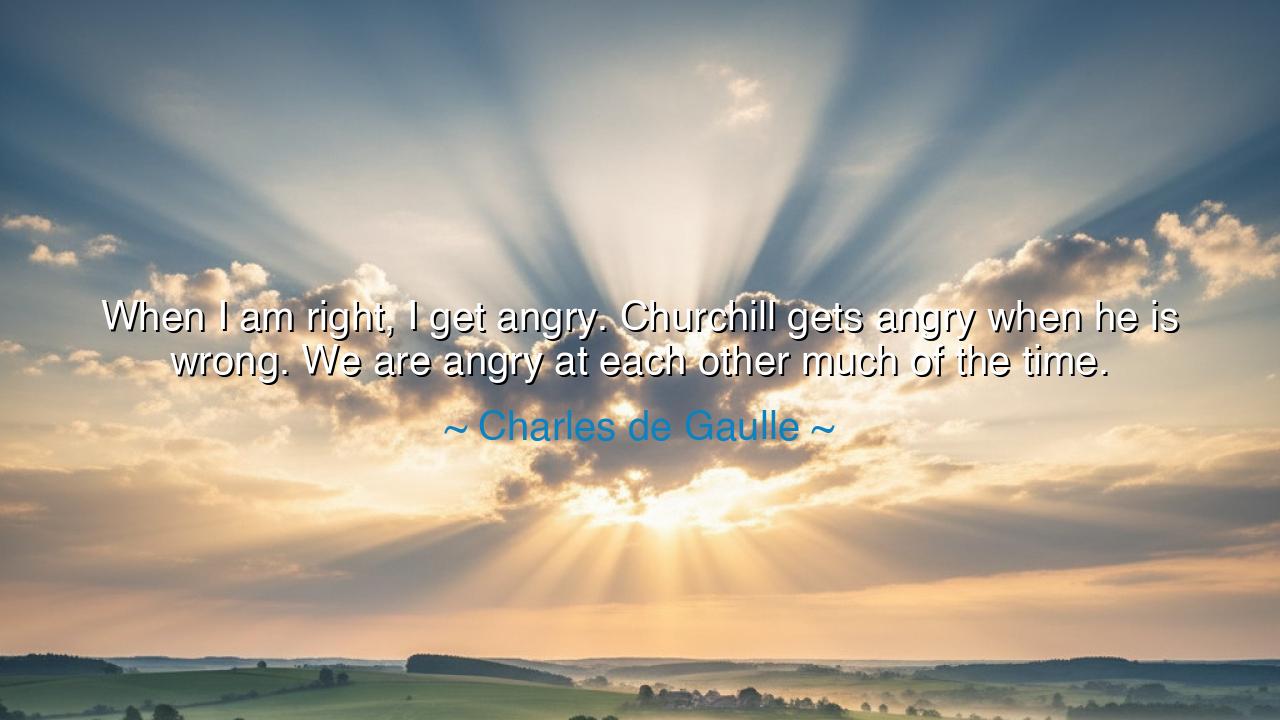
When I am right, I get angry. Churchill gets angry when he is
When I am right, I get angry. Churchill gets angry when he is wrong. We are angry at each other much of the time.






Hear the candid and fiery words of Charles de Gaulle: “When I am right, I get angry. Churchill gets angry when he is wrong. We are angry at each other much of the time.” At first, these words strike as humorous, yet beneath their wit lies the clash of two titanic spirits, each forged in war, each burdened with the fate of nations. It is the confession of a man who stood shoulder to shoulder with a giant, yet never bent his pride. In these words is revealed the nature of leadership: the collision of wills, the storms of ego, and the tempest of conviction.
De Gaulle speaks not only of anger, but of righteousness and stubbornness, those twin fires that ignite when leaders carry the weight of truth as they see it. He admits that his own wrath rose from certainty—“when I am right, I get angry”—for he believed his cause justified and his vision clear. Churchill, in de Gaulle’s telling, grew angry not from righteousness, but from being challenged, from being shown wrong. Thus, two lions roared in the same arena, each unwilling to yield, each convinced of his own necessity. Their anger was not petty quarrel, but the thunder that accompanies great storms of destiny.
Consider the moment in 1940, when France fell beneath the iron heel of Nazi conquest. Churchill urged unity, pressing for France to stand with Britain in a union of resistance. De Gaulle, proud and unbending, sought to lead Free France from exile, clashing often with Churchill’s pragmatism. Here the anger flared: Churchill saw a junior ally demanding equal voice; de Gaulle saw a partner underestimating his nation’s dignity. Neither man would surrender his pride, and yet together, through their quarrels, the Allied cause was strengthened.
This tale mirrors the truth the ancients often taught: that greatness seldom walks hand in hand with humility. Heroes clash as mountains clash—loudly, fiercely, with fire and stone. But from the collision is born not ruin, but valleys rich with new rivers. So it was with de Gaulle and Churchill. Their anger did not destroy their alliance; rather, it tested it, tempered it, and made it strong enough to bear the weight of world war.
The deeper meaning of de Gaulle’s words is this: that anger, when wielded by men of destiny, is both curse and gift. It blinds, yet it also drives. It divides, yet it also compels action. In their constant quarrel, de Gaulle and Churchill revealed that true allies need not always agree, but must never cease in their shared purpose. Their mutual fury, born from pride and conviction, was the fire by which the iron of resistance was forged.
The lesson for us is clear: do not fear conflict when it is rooted in principle. When two strong souls clash in pursuit of truth, their anger can be the hammer that shapes justice. Yet be wary—anger that seeks only dominance, anger that refuses to learn, can consume and corrupt. The wisdom lies in balancing passion with purpose, pride with patience, conviction with humility.
Practical action follows: when you face conflict with another, ask yourself—does this anger arise from truth, or from pride? If from truth, let it burn brightly, but guide it toward resolution, not destruction. If from pride, learn to let it go, lest it blind you. And when working with others of strong will, remember the example of de Gaulle and Churchill: you may clash often, but if your purpose is shared, your struggles may yet carve the path to victory.
So let the words of de Gaulle endure: “We are angry at each other much of the time.” Take them not as a complaint, but as a testament. For even in anger, great men may walk together, bound not by harmony but by destiny. Let your conflicts, too, be shaped into strength, and may your anger, rightly tempered, serve not vanity but the higher calling of truth.






AAdministratorAdministrator
Welcome, honored guests. Please leave a comment, we will respond soon